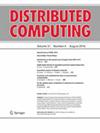GEMA CERMAT (GERAKAN MASYARAKAT CERDAS MENGGUNAKAN OBAT) FOR STUDENT IN THE CITY OF KENDARI SOUTHEAST SULAWESI
IF 2.1
4区 计算机科学
Q3 COMPUTER SCIENCE, THEORY & METHODS
引用次数: 1
Abstract
Background: The problem of rational use of drugs in the community, especially among students, still not many know or still lack of knowledge. The careful echo is a joint effort of the government and the community through a series of activities in realizing the awareness, awareness, understanding and community skills in using drugs appropriately and correctly. Purpose: This activity aims as an effort to improve understanding, knowledge and awareness of the community, especially students about the use of appropriate and correct medicines by providing training in the skills to choose and use drugs properly for self-medication so that drug abuse does not occur as a manifestation of the Program of Echoing Careful. Method: The method to be used in increasing knowledge was the Active Learning method (CBIA). This method was an educational model of community empowerment to be more skilled in choosing drugs so that self-medication becomes more effective, safe, and cost-effective. Results: The result of this program was an increase in student understanding of the types of drugs, forms of drug preparation, and independence in choosing, obtaining, using, storing, and destroying / disposing of drugs correctly and appropriately. Conclusion: The Schematic Echoes Program (GeMa CerMat) increased student knowledge about rational use of drugs and self-medication (Swamedikasi) through how to properly manage drugs, use and choose drugs correctly, and or how to see their efficacy and side effects.苏拉威西岛东南部肯达里市学生用GEMA金属陶瓷
背景:合理使用药物的问题在社会上,特别是在学生中,仍然没有多少人知道或仍然缺乏知识。精心呼应是政府和社区通过一系列活动来实现对药物的正确使用的认识、认识、理解和社区技能的共同努力。目的:本活动旨在通过提供正确选择和使用药物的技能培训,提高社区特别是学生对适当和正确使用药物的理解、知识和意识,以防止药物滥用,这是“呼应谨慎计划”的体现。方法:采用主动学习法(CBIA)增加知识。这种方法是一种教育模式,使社区能够更熟练地选择药物,从而使自我药疗变得更有效、更安全、更具成本效益。结果:提高了学生对药物种类、药物制备形式的认识,正确、适当地独立选择、获取、使用、储存和销毁/处置药物。结论:图式回声项目(GeMa CerMat)通过如何正确管理药物、正确使用和选择药物,以及如何看待药物的疗效和副作用,提高了学生合理使用药物和自我用药(Swamedikasi)的知识。
本文章由计算机程序翻译,如有差异,请以英文原文为准。
求助全文
约1分钟内获得全文
求助全文
来源期刊

Distributed Computing
工程技术-计算机:理论方法
CiteScore
3.20
自引率
0.00%
发文量
24
审稿时长
>12 weeks
期刊介绍:
The international journal Distributed Computing provides a forum for original and significant contributions to the theory, design, specification and implementation of distributed systems.
Topics covered by the journal include but are not limited to:
design and analysis of distributed algorithms;
multiprocessor and multi-core architectures and algorithms;
synchronization protocols and concurrent programming;
distributed operating systems and middleware;
fault-tolerance, reliability and availability;
architectures and protocols for communication networks and peer-to-peer systems;
security in distributed computing, cryptographic protocols;
mobile, sensor, and ad hoc networks;
internet applications;
concurrency theory;
specification, semantics, verification, and testing of distributed systems.
In general, only original papers will be considered. By virtue of submitting a manuscript to the journal, the authors attest that it has not been published or submitted simultaneously for publication elsewhere. However, papers previously presented in conference proceedings may be submitted in enhanced form. If a paper has appeared previously, in any form, the authors must clearly indicate this and provide an account of the differences between the previously appeared form and the submission.
 求助内容:
求助内容: 应助结果提醒方式:
应助结果提醒方式:


